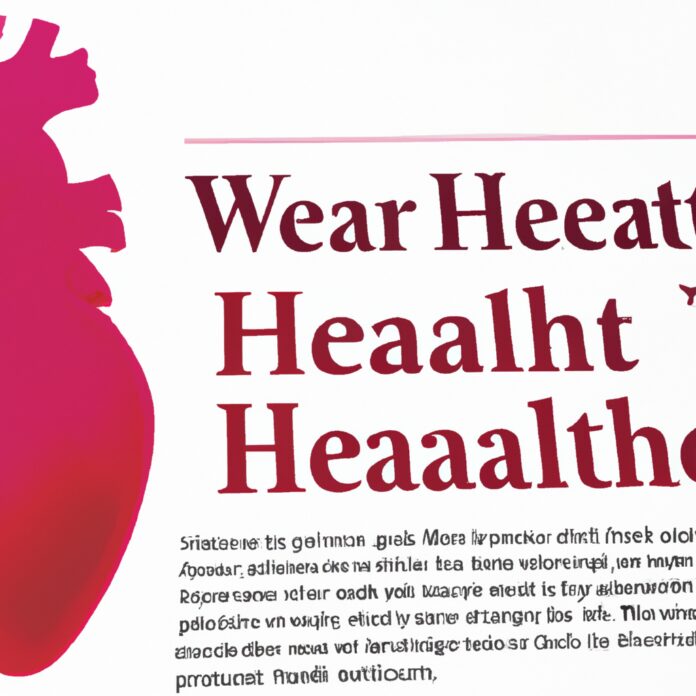A heart that beats with rhythm and resilience is a thing of beauty. However, if women can’t recognize the signs of heart disease, it may lead to fatal outcomes. Heart disease is the leading cause of death among women, and still, many women are not aware of the risks that threaten their hearts. This article will shed light on the importance of recognizing risks and prioritizing prevention for women’s heart health. It’ll explore the various ways in which women can take care of their hearts and ultimately decrease their chances of developing heart disease. It’s time to take control of our heart health, and this article can help us do just that.
1. The Hidden Danger: Understanding the Risks of Heart Disease in Women
Heart disease is often thought of as a health risk for men, but in reality, it is the leading cause of death for women in the United States. As a result, it is essential for women to become more aware of the risks and take steps to maintain their heart health. Here are some key factors to keep in mind:
1. Women’s symptoms of heart disease can be different from men’s. While some women experience chest pain, others may have more subtle symptoms, such as neck or back pain, shortness of breath, fatigue, or nausea. These symptoms may be mistaken for indigestion or the flu, causing women to delay seeking medical attention.
2. Certain factors can increase a woman’s risk of heart disease. These include high blood pressure, high cholesterol, diabetes, smoking, a family history of heart disease, and a sedentary lifestyle. Women who have gone through menopause are also at higher risk due to changes in hormone levels.
3. Prevention is key. Women can reduce their risk of heart disease by making lifestyle changes such as quitting smoking, eating a healthy diet, maintaining a healthy weight, exercising regularly, and managing stress. Regular check-ups with a healthcare provider are also important to assess and address individual risk factors.
Overall, it is important for women to understand the risks associated with heart disease and to take proactive steps to protect their heart health. By doing so, women can improve their overall well-being and reduce their risk of heart-related complications.
2. The Importance of Prioritizing Prevention in Women’s Heart Health
Heart disease is one of the leading causes of death among women worldwide. Women need to prioritize prevention as a critical step in improving their heart health and reducing the risk of developing heart disease. The following are some reasons why preventative measures for women’s heart health are vital:
1. Women face unique heart health challenges: Women are prone to developing heart disease differently than men. Some of the risk factors that women face include hormonal changes, pregnancy, and menopause, among others. Therefore, early detection and prevention of heart disease are crucial to ensuring a woman’s long-term health.
2. Early prevention can reduce the risk of heart disease: Incorporating healthy lifestyle habits such as regular exercise, a balanced diet, and stress management can ward off the onset of heart disease. These preventative measures help to reduce the risk of developing high blood pressure, elevated cholesterol levels, and obesity – all precursors to heart disease.
3. Prevention leads to a higher quality of life: Adopting healthy lifestyle habits has multiple benefits beyond heart health. These habits can boost a woman’s mental and emotional wellbeing, improve sleep, and increase energy levels. By prioritizing prevention measures that support overall health, women can lead happier and healthier lives.
In conclusion, prioritizing preventative measures is a key step towards maintaining women’s heart health. A proactive approach can help to lower one’s risk of heart disease and improve overall quality of life. By making small changes in lifestyle choices, women can make a significant impact on their health outcomes.
3. Taking Control: Lifestyle Changes to Reduce Heart Disease Risk in Women
Women have a higher risk of developing heart disease as compared to men. They should take responsibility for their health and make some healthy lifestyle changes to reduce the risk of heart disease. Here are some tips to help women take control of their health and reduce the risk of heart disease:
- Eat a Heart-Healthy Diet: Eat a diet that is rich in fruits, vegetables, whole grains, low-fat dairy, lean protein, and healthy fats like nuts and olive oil. Limit your intake of saturated and trans fats, sodium, red meat, and sugary foods and drinks.
- Exercise Regularly: Engage in moderate-intensity physical activity like brisk walking, cycling, or swimming for at least 150 minutes per week. You can break it down into 30-minute sessions five days a week.
- Maintain a Healthy Weight: If you are overweight or obese, losing even a small amount of weight can reduce the risk of heart disease. Aim for a healthy body mass index (BMI) of 18.5-24.9.
- Quit Smoking: Smoking is a major risk factor for heart disease. If you smoke, quit. If you don’t, don’t start.
- Manage Stress: Chronic stress can cause high blood pressure, high cholesterol, and other risk factors for heart disease. Manage stress with exercise, relaxation techniques like yoga or deep breathing, or seeking support from family and friends.
- Control Health Conditions: If you have high blood pressure, high cholesterol, or diabetes, make sure to manage these conditions with medication, lifestyle changes, or a combination of both. These conditions can increase your risk of heart disease.
In conclusion, women have a higher risk of heart disease, but they can take control of their health and reduce their risk with some lifestyle changes. Eat a healthy diet, exercise regularly, maintain a healthy weight, quit smoking, manage stress, and control health conditions to reduce the risk of heart disease and improve overall health.
4. The Role of Stress in Women’s Heart Health: Identifying and Managing Triggers
Identifying Stress Triggers
Stress, if left unmanaged, can significantly impact women’s heart health. Identifying triggers can help manage stress levels effectively.
- Firstly, it is critical to be mindful and self-aware of the emotional or physical signs of stress such as intense feelings of anxiety or muscle tension, among others.
- Keeping a journal or diary can also be helpful in discovering patterns or situations that trigger stress. This helps in addressing them proactively and reducing their impact on one’s health.
- Talking to a qualified medical professional who can aid in identifying triggers and offer individualized recommendations for their management.
Managing Stress Triggers
Once an individual has identified stress triggers, there are several effective ways to manage them.
- Regular exercise can help reduce stress and improve cardiovascular health. Practicing exercises such as yoga and meditation have been found to significantly reduce stress levels in women.
- Healthy eating is also a preventative measure against stress as a well-nourished body has more resilience against stress. Stimulants like caffeine and sugar should be limited, and a balanced diet should be consumed.
- Additionally, engaging in activities that one enjoys, relaxation techniques, or taking small breaks throughout the day to unwind can significantly reduce stress levels.
The effects of stress on women’s heart health cannot be ignored, and it’s crucial to identify and manage stress triggers effectively. Making simple changes to daily routines and lifestyle habits, as well as seeking professional guidance, can go a long way in reducing stress levels and promoting a healthy heart.
5. Beyond the Symptoms: Recognizing the Unique Warning Signs of Heart Disease in Women
Women experience heart disease differently than men and often delay seeking treatment as their symptoms are not as obvious. It’s essential to recognize the warning signs to keep your heart healthy and prolong your life. Here are some unique warning signs to look out for:
Fatigue: Women with heart disease often feel unusually tired, drained, and sluggish. The exhaustion can occur despite regular sleep, rest, and exercise. If you experience sudden fatigue, pay attention to your body and seek medical help.
Shortness of breath: Difficulty in breathing is a common warning sign of heart disease in women. It is often misunderstood as a symptom of anxiety or asthma, but it’s not the case always. If you feel breathless even at rest or develop an unfamiliar shortness of breath while doing daily tasks, consult your physician.
Nausea and dizziness: While chest pain may be a clear indication of heart disease, some women often experience nausea or lightheadedness instead. Persistent indigestion or stomach discomfort can also be a warning sign that your heart is in danger. Don’t ignore these symptoms, even if they seem mild.
Jaw, neck, and shoulder pain: Women may not always experience chest pain during a heart attack. Instead, they may feel pressure, fullness, or pain in the jaw, neck, or shoulder region. If you experience unusual discomfort in these areas, seek medical attention immediately.
Recognizing the unique warning signs of heart disease is crucial to prevent long-term damage to your heart. Get regular check-ups and be open with your doctor about your symptoms, no matter how small they seem. Protecting your heart starts with small steps, but the benefits are immense.
6. The Power of Awareness: Spreading the Message of Women’s Heart Health
Women’s heart health is a topic that requires urgent attention. Recent studies have revealed that heart disease is the leading cause of death among American women. Despite this, many women are still unaware of the symptoms and risk factors of heart disease. Therefore, it is important to spread awareness on this topic.
One way to spread awareness is through social media platforms. Women can use their social media accounts to share information about heart health, such as the importance of regular exercise, healthy diet, and stress management. They can also use hashtags such as #HeartHealth or #HealthyHeart to reach a larger audience.
Another effective way to spread awareness is by organizing heart health campaigns and events. Women can collaborate with local hospitals and healthcare organizations to organize health fairs, workshops, and seminars. These events can provide women with valuable information about heart health, such as risk factor assessments, blood pressure screenings, and cholesterol checks.
In addition to social media and events, women can also spread awareness through personal interactions. They can share their own experiences with heart disease and encourage their friends and family to take charge of their heart health. By spreading awareness and educating others about heart health, women can help save lives and contribute to a healthier society.
7. Moving Forward: Advocating for Improved Screening and Healthcare for Women with Heart Disease
Advocating for Improved Screening and Healthcare for Women with Heart Disease
Heart disease is a leading cause of death among women, but it often goes undiagnosed and untreated. As a society, we must advocate for improved screening and healthcare for women with heart disease. Here are some ways we can do this:
- Educate women about the symptoms of heart disease and the importance of regular screenings. Many women don’t realize that they’re at risk for heart disease or that the symptoms can be different than those experienced by men.
- Encourage healthcare providers to take women’s symptoms seriously and to offer appropriate diagnostic testing. Women are more likely than men to have non-obstructive coronary artery disease, which can be harder to diagnose but still requires treatment.
- Advocate for research that focuses on women’s heart health. For too long, heart disease has been studied primarily in men, leading to a lack of understanding about how it affects women differently.
- Press lawmakers and insurance companies to cover the cost of heart disease prevention and treatment for women. Many women can’t afford the necessary tests or medications, which can lead to serious health consequences.
By advocating for improved screening and healthcare for women with heart disease, we can help save lives and improve the quality of life for millions of women. Let’s take action today.
In conclusion, taking care of your heart health is crucial, especially for women who are at an increased risk of heart disease. By recognizing the risk factors and making conscious efforts to prioritize prevention, you can reduce your chances of developing heart disease and improve your overall well-being. Whether it’s making lifestyle changes, seeking medical attention when needed, or simply staying informed, remember that your heart health is in your hands. So, make the commitment to take care of yourself and let your heart beat strong for years to come.





